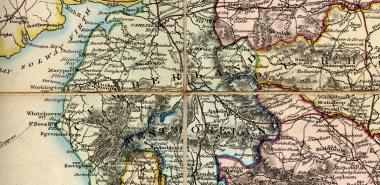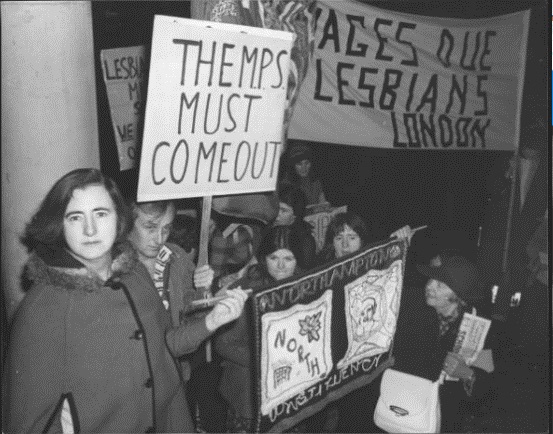Photo embedded from https://blogs.lse.ac.uk/lsehistory/2019/02/13/maureen-colquhoun/
I’ve tried to embed the Getty Images link directly, without success.
Maureen Colquhoun, 1928-2021, was a Labour politician, and the first openly lesbian MP, who pressed tirelessly for women’s rights, moving to Ambleside, Cumbria, in 1992.
Maureen Colquhoun, on the left of the photo, died this year, in February 2021, at the age of ninety two. In 1992, she, and her partner, Barbara Todd, moved to Ambleside, Cumbria, where they spent the latter part of their lives. Maureen Colquhoun became a councillor on Lakes parish council, and she was also a member of the Lake District National Park Authority. Involved in local issues, she sought, for example, speed limits on Lake Windermere and fewer low flying military exercises over the Lake District.
Maureen Colquhoun was born on 12 August, 1928, in Sussex. As the photograph above suggests, she went on to live an active political life. She joined the Labour party as a teenager, and then studied at the London School of Economics. She became a West Sussex councillor for the party, in Shoreham. During her time as a councillor here, she was blocked briefly by Conservatives from sitting on committees, and described as a “chatterbox”. Colquhoun was, in fact, the only woman member of the council authority at this time.
In 1974, Colquhoun was elected as the MP for Northampton North. She served as MP until losing her seat in the 1979 general election, following a deselection battle. During Colquhoun’s time as MP, she made her mark, raising issues, with which today, we have become more familiar. In 1975, she argued for the provision of a creche for female delegates at Labour party conferences. Colquhoun also asked the speaker in the House of Commons, George Thomas, to address her as Maureen Colquhoun or as Ms Colquhoun. Thomas agreed to pronounce the prefix in a way which would elide the distinction between Mrs and Miss. We are all familiar with the use of Ms as a title today, but it was rare in 1976, and the first time that such a request had been made in the House of Commons.
Colquhoun introduced a private member’s bill to the house in 1975, the Balance of Sexes Bill. It proposed equal numbers of men and women for public appointments. In the order for the second reading of the bill, Colquhoun said, “My Bill is designed positively to discriminate for women…
shall merely draw the attention of the House today to some of the everyday bread-and-butter bodies that affect everybody’s lives. For example, the Sugar Board has five men and no women. The Agriculture Training Board has 27 men, no women. Is it to be said that the only rôle of the woman in agriculture is that of the farmer’s wife?
The Committee of Investigation for Great Britain has seven men, no women. I cannot think how Great Britain can be investigated without the help of women.”
You can read more here. The discussion of the time does not go into non binary gender or gender non-conforming issues, except insofar as it concerns the role of women in public life.
Colquhoun’s bill did not become law, but it pushed on the debate about equal opportunities in a pioneering way. Subsequent legislation and measures reflect the way that attitudes have shifted, and we do sometimes see positive discrimination today.
At this time, in 1975, Maureen Colquhoun met Barbara or Babs Todd, and the two women fell in love. Barbara Todd was co-editing the lesbian and bisexual women’s magazine, Sappho, which she and Jackie Forster, and other women had founded. This magazine was started in 1972, after the first British lesbian magazine, Arena Three had folded, and it continued until 1981.

Courtesy of Glasgow Women’s Library
Colquhoun left her husband, Keith, and moved in with Todd. Their housewarming party led to public exposure, in that Nigel Dempster revealed the women’s relationship in the Daily Mail newspaper, in 1976.
This, and other issues, led to Colquhoun being deselected as a candidate in 1977 by the Labour party, some of whom did not approve of her “obsession with trivialities such as women’s rights”. Colquhoun was later reinstated as a candidate, but lost her seat of Northampton North in the 1979 general election. Before Colquhoun left parliament, in 1979, she introduced a bill to decriminalise prostitution, the Protection of Prostitutes Bill. She brought fifty prostitutes into the committee room in the House of Commons for the first reading of the bill (LSE). This bill did not become law, although it was allowed a second reading. The issues which it raised are still very much debated today.
After leaving parliament, Maureen Colquhoun remained active, in the charity Gingerbread, as a research assistant, in the Secretaries and Assistants’ Council and becoming a councillor in Hackney, where she served from 1982-1990. In 1992, as I have mentioned, she and her partner, Barbara Todd, moved to Ambleside, Cumbria. Colquhoun and Todd married in 2015, and lived together until Barbara Todd died in February of 2020. Maureen Colquhoun, who died a year later has left a political legacy behind her.
Acknowledgements:
https://blogs.lse.ac.uk/lsehistory/2019/02/13/maureen-colquhoun/
https://en.wikipedia.org/wiki/Maureen_Colquhoun
http://www.bbc.co.uk/cumbria/content/articles/2005/08/24/low_flying_feature.shtml
https://www.theargus.co.uk/news/12950825.maureen-colquhoun-a-vocal-revolutionary/
https://api.parliament.uk/historic-hansard/commons/1975/may/16/balance-of-sexes-bill
https://blogs.sussex.ac.uk/librarycollections/2021/07/02/listening-to-maureen-colquhoun/
A blog on Maureen Colquhoun, politics, and sound heritage, with a clip of Maureen Colquhoun speaking in a 1973 interview.
https://womenslibrary.org.uk/2012/02/09/archive-item-of-the-month-sappho/
https://womenslibrary.org.uk/2016/09/14/sappho-and-lesbian-visibility-making-the-personal-political/

